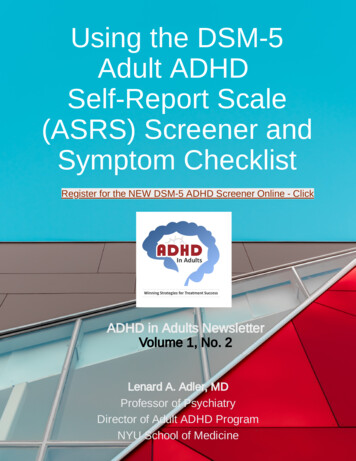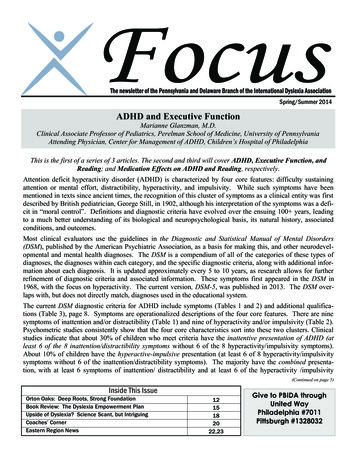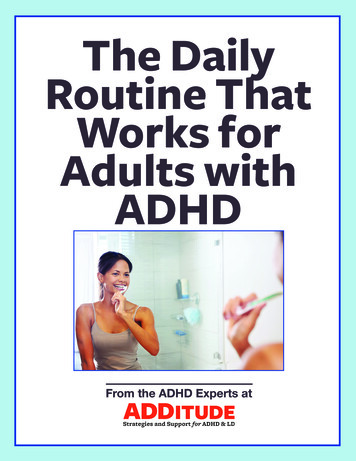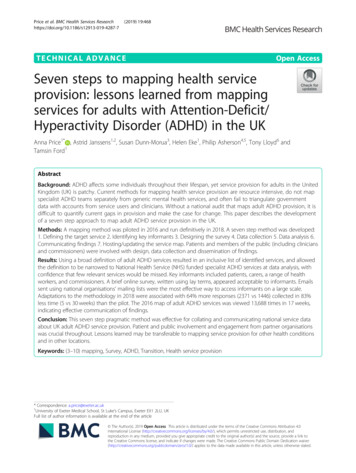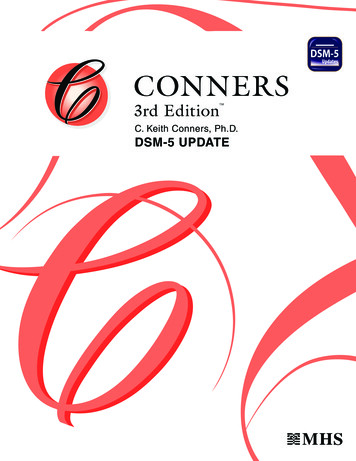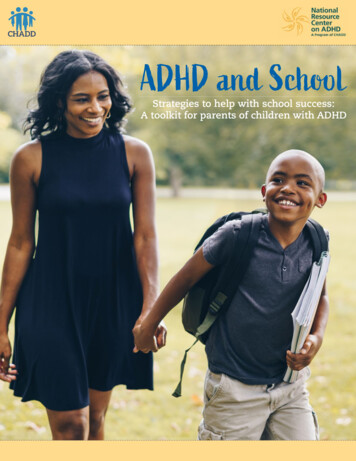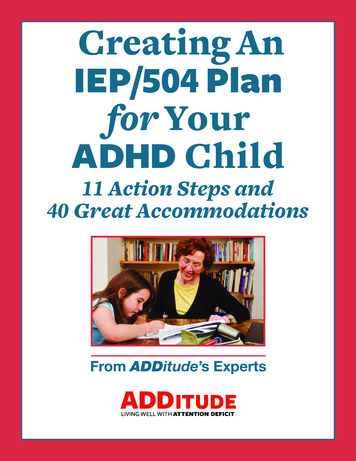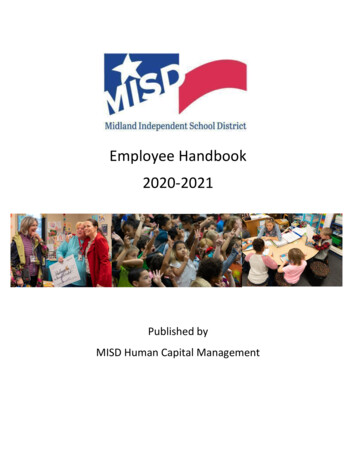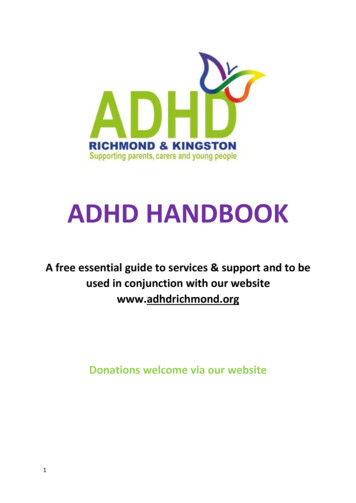
Transcription
ADHD HANDBOOKA free essential guide to services & support and to beused in conjunction with our websitewww.adhdrichmond.orgDonations welcome via our website1
ContentPagesPre-ADHD diagnosis3-6ADHD pathways - post-diagnosis7-8Interventions, strategies & therapies9 – 13For parents14 - 15Medication16Health Care17Education18 - 19Benefits & allowances20 - 22Activities23 - 24Local services and contacts A-Z25 – 29Further reading30Useful national links31Acronyms32 - 33About ADHD Richmond and Kingston34Updated: June 20192
PRE-ADHD DIAGNOSISMany children go through phases where they are restless or inattentive. This is often completelynormal and does not necessarily mean they have ADHD.Symptoms of ADHD tend to be first noticed at an early age, and may become more noticeable whena child’s circumstances change, such as when they start school. Most cases are diagnosed in childrenbetween the ages of 6 and 12.Childhood ADHD is more commonly recognised & diagnosed in boys than girls. Girls with ADHDoften have a form of the condition where the main symptoms relate to problems with attentionrather than hyperactivity, which can cause less noticeable symptoms.Children with ADHD can become easily frustrated because of executive function difficulties.ADHD is a complex neurodevelopmental condition, a brain disorder due to lack of dopamine, whichstarts during child development but frequently persists through adolescence and into adulthood.ADHD frequently occurs alongside other conditions (comorbidities) such as anxiety, autism,depression, dyslexia, dyspraxia, epilepsy, sensory processing disorder, Tourette’s syndrome andespecially in cases of untreated ADHD or late diagnosis - oppositional defiant disorder (ODD)People with ADHD may also have additional problems such as sleep.ADHD can occur in people of any intellectual ability including both those who are gifted (dualexceptionality) and those with learning difficulties. Remember, children with ADHD are differentfrom one another in both their needs and the support or services required to meet themCriteriaFor someone to be diagnosed, he or she must have at least six (or more) of the following symptomsbefore the age of 12. The symptoms must also exist for six months or more and to a degree that isdifferent from those considered normal for similarly aged children in an academic environment orextra-curricular activity. 3Often fails to pay attention to details or makes careless mistakes in schoolwork, at work, orduring other activitiesTends to have difficulty sustaining attention during tasks or recreational activities, such as inclass, in conversations, or during prolonged readingDoes not seem to listen when spoken to directly, and seems to have other things on his orher mind even when there is not an obvious distractionFails to follow instructions and finish schoolwork, chores, or work duties (may start work butbe distracted quickly and easily evade it)Has difficulty organising tasks and activities and putting belongings in order. He or sheneglects work, has poor time-management skills, and does not meet deadlinesAvoids and dislikes tasks that require sustained mental effort, such as schoolwork or choresOften loses things necessary for tasks or activities, such as school supplies, pencils, books,tools, wallet, keys, working papers, glasses, or mobile phones
Easily distracted by external stimuliForgets daily activities, such as homework or doing errands, or in older teens and adults,returning calls, paying bills, or keeping appointmentsThe symptoms are not solely a manifestation of oppositional behaviour, defiance, hostility, or failureto understand tasks or instructions. To be diagnosed with ADHD, a person must also show six ormore of the following symptoms of hyperactivity and impulsivity: Fidgets with hands or feet or squirms in seatFrequently gets up in situations where he or she is expected to remain seatedRuns around or climbs in situations where It is not appropriate (in teens or adults, this maybe limited to fidgeting)Unable to quietly play or engage in leisure activitiesTypically too “busy”, acting as if he or she has to do thingsTalks excessivelyOften responds unexpectedly or before a question is concluded or finishes someone else’sthoughtHas difficulty waiting his or her turnInterrupts or intrudes on others; distracts others or does not realise he or she is botheringanyoneKeep in mind that the symptoms must also meet these criteria:Be present for at least six monthsHave started before the age of 12Be present in two or more places, such as at school and in the homeNegatively affect day to day lifeNot occur solely due to a psychotic conditionNot be better explained by another mental condition.If your child is presenting, as described, you should consider raising your concerns with your child’steacher, their school’s special educational needs co-ordinator (SENCo) or your GP.The Single Point of Access (SPA) of Achieving for Children is the first port of call for diagnosis ofADHD Tel: 020 8547 5008 for advice from 8am to 6pm, Monday to Friday, or 020 8770 5000 out ofhours.What happens in an assessment?The young person, parents/carers & schools are asked to complete questionnaires to assistprofessionals decide if a medical diagnosis is necessary or if there are other ways to help. Then aconversation will be arranged to find out more about the young person today and in earlierchildhood. There’s no need to prepare; simply explain what life is like at home and at school.4
The ADHD pre-diagnosis pathwayTeachers can be the first to spot ADHD but you can also aska GP, or any health professional, and social workers foradvice. They can refer your child to a specialist team viathe Single Point of Access (SPA) of Achieving for Children,the Council backed community interest group.The Single Point of Access (SPA) can be contacted directlyby you in seeking an ADHD assessment for your child. Tel:020 8547 5008 Out of hours Tel: 020 8770 5000. If anassessment is agreed you will be passed on.Typically diagnosis is done by a community paediatricianfor 0-5 yr olds and the neurodevelopmental team for 5-18yr olds. When a child is diagnosed, medication and otherinterventions should be discussed. If a diagnosis is notapproved, you can ask for a second opinion.Once a report is completed, a Support Plan should beagreed with parents/carers. Recommendations for a rangeof options should be made. You should also be directed toservices and support available.A more detailed diagnosis pathway, from Achieving for Children is here.ADHD Richmond and Kingston is there to support families and carers of children and youngpeople with ADHD. Further information on steps post diagnosis is set out below.5
As set out above, assessment & diagnosis is usually accessed via the NHS. However unfortunately,there is often a long waiting list as a result some parents/carers decide to go privately.Your GP may be able to recommend psychiatrists who practice privately and here are some contactswe know: Prof Peter Hill - The First Floor, 127 Harley Street, London W1G 6AZ Tel: 020 7486 2332Dr Claire Scott is a consultant community paediatrician who as well as working for Hounslowand Richmond Community Care has a private practice. Tel: 07796 783007The Effra Clinic is based in London and it specialises in ADHD and autism spectrum disorder.The staff includes two consultant child and adolescent psychiatrists with a shared passionand specialism in ADHD and ASD. Tel: 020 3322 5532 Email: admin@effraclinic.co.ukLANC - Learning Assessment and Neurocare Centre, 60 Bloomsbury Street, London 01403240002 Email: info@lanc.ukNicola Ryan Mental Health Nurse Tel: 07866 388935 Email: nickishouse266@hotmail.comDr Bettina Hohnen contact@drbettinahohnen.comDr Bozhena Zoritch 07957909754 https://www.addmire.org/Remember though if you receive a private diagnosis and the consultant recommends treatment withmedication, then your GP needs to refer you via SPA to CAMHS Tier 3 for NHS treatment.COMORBIDITIESComorbidity is the medical term for two or more disorders that occur at the same time. In general,individuals affected by ADHD often have other disorders that impact their ability to functionsuccessfully. The comorbidity of ADHD with other disorders is between 60% and 80%. Whencomorbid conditions are present, it can make the diagnosis of ADHD much more difficult to pinpointand the symptoms harder to treat.Comorbid disorders that may occur alongside ADHD are: ASD/AS, Autism, Anxiety, ConductDisorder, Depression, Dyslexia, Dyspraxia, Obsessive Compulsive Disorder, Oppositional DefiantDisorder, Sensory Integration Disorder, Speech/Communication problems, Tourette’s Syndrome orPAD.6
ADHD PATHWAYS – postdiagnosisNo two children or young people with ADHD are the same and therefore making a diagnosis requiresa specialist assessment, usually by a child psychiatrist or specialist paediatrician. The diagnosis ismade by analysing patterns of behaviour, observing the child, obtaining reports from home and atschool.Receiving a diagnosis of ADHD for your child or teen can be a huge relief, or indeed a big cause forconcern. A diagnosis can help when explaining your child’s condition to other people. It can alsomake it easier when you are stating your case to obtain appropriate support and access to services.This may include: obtaining an Education, Health and Care Plan; accessing medical and socialservices; reasonable adjustments under the Equality Act; and obtaining disability-related funding.7
The ADHD post-diagnosis pathway to medication,interventions, therapy & supportThe Single Point of Access (SPA) of Achieving for Childrencan offer you a further route to a range of Children’sServices including enquiries about therapy and support.Need help at any time? You, your SENCo, GP, or familyworker can ask for referral. Tel: 020 8547 5008 Out ofhours Tel: 020 8770 5000.The Child and Adolescent Mental Health Service (CAMHS),which has diagnosed your child with ADHD, will discussmedication and all other interventions and referral optionswith you for an outline care plan.123 Magic Parenting: Once your child (up to age 13 yrs) hasa diagnosis you are recommended to attend this coursewhich will help you understand managing ADHD andbehaviour. Book karen.williams@achievingforchildren.org.uk020 8547 6965 or 07771 974388Post-diagnosis workshop: ADHD Richmond and Kingston,with the NHS, has developed a two-hour information sessionwhich you are recommended to attend (after 123 Magic) tolearn about the impact, diagnosis, school, interventions &local services. Book at bookings@adhdrichmond.orgThe Emotional Health Service can provide CognitiveBehaviour Therapy if your child also displays significantemotional distress, low mood or anxiety. Contact via SPAADHD Richmond and Kingston is a local Support Groupfor parents & carers of children and young people withADHD. We can help advise you on all matters relating toADHD e.g. sharing of information (strategies, education,legal, funding and further contacts), supporting familiesand carers (seminars, workshops, closed Facebookforum) and empowering those with ADHD (regularnewsletter and information on support and servicesavailable locally).www.adhdrichmond.org8
INTERVENTIONS,STRATEGIES & THERAPIESIf your child has been given a diagnosis of ADHD, it is very natural to want to find out more about thecondition. Best practice is for diagnosticians to offer a programme of follow-up support, includingadvice, and signposting to other services e.g. behaviour training for parentsA child with ADHD needs intervention across all situations where the difficulties occur including athome, school, with friendships, and in the community.It is very important for the family, teachers and professionals to understand the child’s condition;how it affects them; and management strategies. As they grow up, the young person needs to beaware of their condition and how to manage it.Many children and young people could benefit from specific strategies and therapeutic intervention.These may:Art PsychotherapyArt Psychotherapy offered by the Emotional Health Service working with children with ADHD andtheir parents. Contact the Single Point of Access of Achieving for Children Tel: 020 8547 5008 Out ofhours Tel: 020 8770 5000Challenging BehaviourThere are some information leaflets from The Challenging Behaviour Foundation, which will guideyou to some best practice: Sheets 1 2 3Cognitive Behavioural Therapy (CBT)CBT is a type of talking therapy that attempts to change how people think (cognitive) and what theydo (behavioural). It can either be carried out one-to-one with a therapist or in a group setting. TheEmotional Health Service offers CBT mainly for mental health difficulties. It’s important when askingfor CBT to stress your child also displays significant emotional distress, low mood or anxiety,depression or sleeping issues NOT just ADHD! Referral can be made via the AFC website.You may download this free eBook on Cognitive Behaviour Intervention and this free Workbookfrom Pesky Gnats or try this online payable course from Brave Online and here is our friend, Dr JadeSmith’s, book on Adapting CBT for Children with ADHD Find a therapist and our friends at The EffraClinic and Nicola Ryan offer CBT9
Counselling and PsycotherapyThe symptoms of ADHD can result in a variety of challenges ranging from broken friendships to lowself-esteem to anxiety or depression. Long or short-term counselling may help some to processfeelings and develop strategies for dealing with the effects of ADHD. Private psychotherapists areavailable. Real Talk offers counselling for 5-18 yr olds in SW London and Off the Record provide aservice for 11-24 yr oldsDietWe believe families should have a balanced diet of good quality nutritious fresh food. Sugary andprocessed foods with artificial colourants and additives should be avoided where everpossible. Equally fried foods with trans-fats should be kept to a minimum. ADHD children andothers with learning difficulties often encounter food intolerances which may also come from foodswhich are nutritional and fresh.By keeping a food diary parents can often see a link between food consumed and its adverse effecton children eg. sore tummy after eating, deteriorating behaviour, etc. This can then be furtherexplored with an experienced health professional such as nutritionist or kinesiologist.Educational PsychologistsThey are available via school (see Education) or privately, see the Association of Child Psychologistsin Private Practice an example is Susanna Goncalves http://www.serutufutures.comBe advised that there is no guarantee the LA would use an independent EP report for EHCP purposesEmotional Health ServiceThis team of Achieving for Children works with children and young people up to the age of 19 yearsold who have a Richmond or Kingston home address. The focus of this service is early interventionand prevention, including consultation, training and short term direct therapeutic interventions.Contact the Single Point of Access Tel: 020 8547 5008 Out of hours Tel: 020 8770 500010
ExerciseRegular physical activity decreases the severity of ADHD symptoms and improves cognitivefunctioning in children. It has a positive, measurable impact on their focus and mood. Exercisebreaks for children with ADHD are recommended. See our ACTIVITIES section.Herbal MedicineThis may offer benefits for children with ADHD, for example in the areas of stress & sleep problems.Contact The National Institute of Medical Herbalists Tel: 01392 426022 Email: info@nimh.org.ukHomeopathyThis may also help with conditions such as dietary and sleep problems. Ask your GP or otherhealthcare professional for a contact. It is also possible to search for a local homeopath through TheAlliance of Registered Homeopaths Tel: 01825 714506 Email: info@a-r-h.orgMusic TherapyRichmond Music Trust offers music therapy for ADHD/SEN. Contact: Richmond Music Trust. 7, BriarRoad, Twickenham TW2 6RB Tel: 020 8538 3866 Email: admin@richmondmusictrust.org.ukOtakar Kraus Music Trust offers music therapy to children with special needs, regardless of ability orage. These fun sessions encourage children to experience different ways to explore their imaginationin a musical context and to develop their communication and listening skills. The Otakar Kraus MusicTrust, 3 Twining Avenue, Twickenham. TW2 5LL Tel: 020 8894 2007 Email: info@okmtrust.co.ukNeurofeedbackThis treatment is valued by those who have tried it. Here’s our video of Dr Neil Rutterford, check outhis company here and see his PowerPoint: Dr Neil Rutterford – LANC – pp11
Occupational Therapy (OT)Occupational Therapy can benefit children with ADHD with sensory skills, physical coordination,organization, controlling energy levels, hyperactivity, working out anger and aggression, improvingfocus, handwriting, social skills, time management. Tel: 020 8891 8136 Visit also occupationaltherapy unit. For independent services visit The Royal College of Occupational Therapists Find outhow OT can help your ADHD child hereOsteopathy (including cranial osteopathy)Osteopaths advocate gentle manipulation of the head which may relieve certain problems,including stress and digestion difficulties. Contact: The General Osteopathic Council Tel: 020 73576655 Email: contactus@osteopathy.org.uk Try The Maris Practice.13, Baylis Mews, Amyand ParkRoad, Twickenham. TW1 3HQ Tel: 020 8891 3400 Email: mail@themarispractice.com or treatmentsis Nargis Ahmad - Ivy Tree Clinic - Tuesdays to Saturdays - 190, Kingston Road, Teddington. TW119JD. Tel: 020 8943 1728PsychiatryReferrals are normally made via your GP for both NHS and private. Visit The Royal College ofPsychiatristsPsycho-educationThe National Institute of Health and Care Excellence (NICE) and European guidelines recommendpsycho-education for the patient and their families as a first step in the treatment of ADHD. Yourchild will be encouraged to discuss ADHD and how it affects them. It can help children, teenagersand adults make sense of being diagnosed with ADHD and can help them cope and live with thecondition. Ask your Consultant or educational psychologist for more information.12
PsychologistsThe NHS can offer psychological therapies (ask your GP or Consultant). Private ADHD childpsychologists in Richmond (and search beyond) can be found at the Association of ChildPsychologists in Private Practice - AChiPPPPsychotherapistsCounsellors and Psychotherapists in and near Richmond and Kingston. Also the Institute ofPsychotherapy & Disability and Human-GivensSleep managementGood sleep hygiene is an important aspect of managing ADHD including optimising attention andmood the following day. Sometime medication, a side effect of medication used to treat ADHD, cancause sleep difficulties.It’s important to remove all electronic visual devices from the bedroom at least 1 hour beforebedtime. ADHD children can benefit from listening to low-level music or talk radio at bedtime.If good sleep hygiene alone is ineffective, medication such as a sleeping tablet (melatonin) may beoffered by your consultant psychiatrist or GPSocial skillsMany children with ADHD have trouble with social skills and building friendships. They may choosenot to socialise very much because it can be difficult, often because of impulsive acts, and this maycause considerable anxiety. There are often difficulties understanding the unwritten 'social rules'.How close do you stand to another person? Many find it hard to understand or interpret otherpeople's thoughts, feelings or actions, and therefore to understand their intentions. This type oftraining involves your child taking part in certain ‘role play’ situations to teach them how to behavein a social setting and how their behaviour affects others around them. Watch this video and see theADHD and social skills – Dr Lax Pericall slides from our Talk on Social Skills. Contact RichmondPaediatric Speech and Language Therapy Department: Tel: 020 8973 3512 (for Kingston 020 83398000)13
Speech & Language (SaLT)Those with ADHD may be good at basic communication but struggle with attention and listening;coping with instructions; interacting appropriately for their age; understanding gestures, bodylanguage and facial expressions; they may not be aware of what is socially appropriate. ContactRichmond Community Healthcare Tel:020 8973 3512 or for the Kingston Team Tel: 020 8339 8000Private therapists can be found at The Association of Speech and Language Therapists inIndependent Practice.14
FOR PARENTSAs your child’s role model and most important source of strength, it is vital that you live a healthylife. If you are overtired or have simply run out of patience, you risk losing sight of the structure andsupport you have so carefully set up for your child with ADHD. Having a child with ADHD is highlystressful and exhaustingParenting coursesParent training programmes are essential part of understanding ADHD. The NICE guidelines say youshould attend these courses, alongside any other treatments your child may be receiving. ADHDRichmond and Kingston partnered with Achieving for Children to produce excellent 123 MagicParenting courses if your child is between 2-13 yrs. Register your interest with thisParenting Self Referral Form Sept 14 1They are free of charge and we recommend both parents attend, even if it’s on separate occasions.You will gain a better understanding about ADHD, learn how to better manage your child with ADHDand also how children feel about the condition. There are 6 workshops in all and by the end you willhave met a group of parents who are dealing with exactly the same types of issues relating to thecondition. Contact Karen Williams Tel: 0208 5476965 or 07771 974388 st-diagnosis workshopsADHD Richmond and Kingston has been awarded an NHS contract to provide, to Richmond & Kingstonparents of children with ADHD, free post-diagnosis information sessions. Book your place atbookings@adhdrichmond.orgWellbeing – Look after yourself 15Take care of yourself. Eat well, exercise, and find ways to reduce stress, whether it meanstaking a nightly bath or practicing morning meditation. If you do get sick, acknowledge it andget help.Seek support. One of the most important things to remember in rearing a child with ADHD isthat you don’t have to do it alone. Talk to your child’s doctors, therapists, and teachers. Joinour support group for parents of children with ADHD which offers a forum for giving andreceiving advice, and provides a safe place to vent feelings and share experiences.
Take breaks. Friends and family can be wonderful about offering to babysit, but you may feelguilty about leaving your child, or leaving the volunteer with a child with ADHD. Next time,accept their offer and discuss honestly how best to handle your child.Richmond Carers Centre offer a variety of workshops & counselling for carers Tel: 020 8867 2380Email: info@richmondcarers.orgRichmond Wellbeing Service is a free and confidential service for local people who experiencedepression, anxiety, sadness, anger, extreme shyness, obsessive behaviour, phobias, relationshipdifficulties or other psychological issues. It offers group workshops, counselling, self-help courses, arange of talking therapies and computer-based therapies. The service is run through a partnershipbetween East London NHS Foundation Trust and Richmond Borough MIND. Contact: NHS RichmondWellbeing Service Richmond Royal Hospital, Kew Foot Road, Richmond upon Thames, TW9 2TE Tel:020 8548 5550 / 020 3513 3266Live Well Richmond is a free health improvement service available to anyone over the age of 16 whoeither lives or is registered with a GP in Richmond. It offers free help and advice to help you developa healthy lifestyle and improve your health and wellbeing. Tel: 0208 487 1745 Email:info@livewellrichmond.org.uk16
MEDICATIONMedication can play an important role in managing moderate to severe ADHD. It can help reducehyperactivity and improve concentration. The consultants at the Mental Health Team in Richmondand Kingston will discuss with you if medication is suitable. This decision is for you and yourchild/teen. Try to think hard about the areas where your son or daughter is really finding thingsdifficult and ask the consultant if these areas will be improved by the use of a particular type ofmedication, or if there are other therapies they can suggest. These may also go side by side with themedication. Medication is not right for some children, and, in some cases, there may be otherinvestigations that will need to be carried out to find out if medication is suitable.Watch our short video with Prof. Peter HillMedications used to treat ADHD are broadly divided in two groups: Stimulants, like methylphenidate(Medikanet or Concerta are the brand names) used mainly in Richmond and Kingston anddexamphetamine and non-stimulants like atomoxetine.Stimulant medication (methylphenidate) is usually prescribed first. The type of stimulant prescribedwill depend on a number of things like the symptoms your child has, your choice of treatment, theease of giving the medication and even availability/cost of the medication.ADHD is most often treated with stimulant medication which return dopamine to normal levels inthe brain. Medication does not cure ADHD – it can only reduce the difficulties it causes. Also, theyare very powerful drugs – some are classed as amphetamines – and can carry other health risks.Sometimes medication can have side effects. The reported side effects of stimulant medication forADHD include difficulty sleeping and appetite loss (common), irritability and mood swings,depression, headaches, upset stomach, dizziness, tics (uncommon), racing heartbeat and high bloodpressure (very rare). Sometimes growth slows down when children are on methylphenidate. Forthese reasons, stimulant medication is only prescribed to children who have been professionallyassessed and diagnosed by an expert, and will be reviewed regularly.Sometimes a child may respond to a different form of methylphenidate or other stimulant or nonstimulant medications may be prescribed.Most children and young people need the medication at least until they finish their education orschooling. A few might need to take it even when they grow up in order to focus at work. Somechildren need medications only at specific times, like for example while attending school and do nothave to take it on weekends or on school holidays, however, this needs to be discussed with yourdoctorStopping medication can cause symptoms to return, and some young people can put themselves atrisk in terms of their education, their work, and socially by being impulsive and taking alcohol ordrugs.Remember: if you have any questions regarding medication, do not hesitate to contact yourdoctor17
HEALTH CAREHere are some of the health care services which may be useful to you:Community Paediatrics (Hounslow and Richmond) is a specialist child health assessment anddiagnostic service to meet the needs of children with special or complex health needs. They workvery closely with other health professionals, such children’s therapies, and also offer jointassessments as well as non-health specialists working in education and social care Tel: Tel: 020 37716100 Email: hrch.richmondcompaed@nhs.netEmotional Health Service: Tier 2 CAHMS Service offers an early response to children and youngpeople experiencing poor emotional well-being and mild-moderate mental health issues. ContactSPA Tel: 020 8891 7969 Out of hours Tel: 020 8770 5000Hospital Passports: Patients who have learning disabilities can be given a Learning Disability HospitalPassport by their GP or through their learning disability social services team, just in case they have tobe admitted to hospital. These passports can be used to list such important information as personaldetails, capacity plus level and type of support required, best ways to communicate, behaviouralissues (and how to deal with them) past medical interventions, allergies, etc NHS Choices guide for people who have care and support needs, their carers and people who areplanning for their future care needs.18
EDUCATIONFor parents/carers:A child or young person exhibiting symptoms of ADHD has special educational needs (SEN). They arehighly likely to require support and/or adjustments additional to their peers. Despite often being ofaverage or above intelligence, impaired ‘executive functions’ can make managing the demands ofthe school environment, designed for a neurotypical child, really difficult. Common challengesinclude: staying seated, sustained focused on learning tasks; not calling out during lessons;relationships with peers and teachers; organisation and acting impulsivity particularly when anxiousor managing frustration.Special educational provision may include help with learning and/or with navigating the schoolenvironment. Examples include additional adult support or therapeutic intervention such asoccupational therapy, social communication and emotional literacy programmes or movementbreaks.A child with ADHD should at the very least be on ‘SEN Support’ if their needs can be met from theschool’s own resources. They should have an Education Health and Care Plan if additional funding isrequired to meet their needs or a specialist school placement is appropriate. Unfortunately, parentsare often given inaccurate information about their child’s entitlement to support, it is thereforeadvisable to contact an organisation independent from school and the local authority for advice.This help can be accessed for free via an independent charity such as IPSEA or SOS SEN or via aneducation solicitor those on a low income may be eligible for legal aid.Subject to few exceptions, a child with ADHD is entitled to the prote
Prof Peter Hill - The First Floor, 127 Harley Street, London W1G 6AZ Tel: 020 7486 2332 Dr Claire Scott is a consultant community paediatrician who as well as working for Hounslow and Richmond
